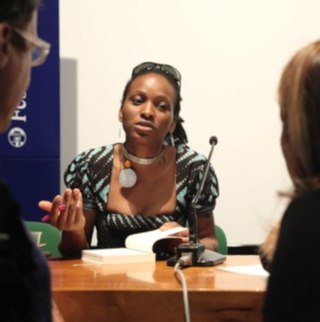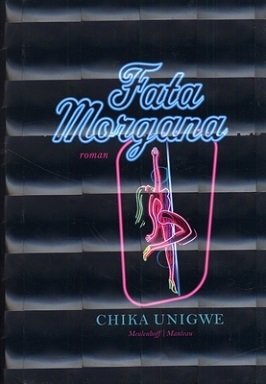The International Dublin Literary Award, established as the International IMPAC Dublin Literary Award in 1996, is presented each year for a novel written or translated into English. It promotes excellence in world literature and is solely sponsored by Dublin City Council, Ireland. At €100,000, the award is one of the richest literary prizes in the world. If the winning book is a translation, the prize is divided between the writer and the translator, with the writer receiving €75,000 and the translator €25,000. The first award was made in 1996 to David Malouf for his English-language novel Remembering Babylon.
The Victorian Premier's Literary Awards were created by the Victorian Government with the aim of raising the profile of contemporary creative writing and Australia's publishing industry. As of 2013, it is reportedly Australia's richest literary prize with the top winner receiving A$125,000 and category winners A$25,000 each.

Chika Nina Unigwe is a Nigerian-born Igbo author who writes in English and Dutch. In April 2014 she was selected for the Hay Festival's Africa39 list of 39 Sub-Saharan African writers aged under 40 with potential and talent to define future trends in African literature. Previously based in Belgium, she now lives in the United States.
The Sami Rohr Prize for Jewish Literature is an annual prize awarded to an outstanding literary work of Jewish interest by an emerging writer. Previously administered by the Jewish Book Council, it is now given in association with the National Library of Israel.
The Nigeria Prize for Science is a Nigerian science award given annually since 2004 for excellence in science breakthroughs. It is the country's highest scientific award. The award is sponsored by Nigeria LNG Limited. The prize describes itself as "bringing Nigerian scientists to public attention and celebrating excellence in scientific breakthroughs".

The 9mobile Prize for Literature was created by Etisalat Nigeria in 2013, and is the first ever pan-African prize celebrating first-time African writers of published fiction books. Awarded annually, the prize aims to serve as a platform for the discovery of new creative talent out of the continent and invariably promote the burgeoning publishing industry in Africa. The winner receives a cash prize of £15,000 in addition to a fellowship at the University of East Anglia.
Tade Ipadeola is a Nigerian poet who writes in English and Yoruba. He is a practising lawyer. In 2013 his poetry collection The Sahara Testaments won the prestigious Nigeria Prize for Literature instituted by the Nigeria Liquified Natural Gas (NLNG). In 2009, he won the Delphic Laurel in Poetry for his Yoruba poem "Songbird" at the Delphic Games in Jeju, South Korea.

Abubakar Adam Ibrahim is a Nigerian writer and journalist. He was described by German broadcaster Deutsche Welle as a northern Nigerian "literary provocateur" amidst the international acclaim his award-winning novel Season of Crimson Blossoms received in 2016.

Elnathan John is a Nigerian novelist, satirist and lawyer whose stories have twice been shortlisted for the Caine Prize for African Writing.

The Aké Arts and Book Festival is a literary and artistic event held annually in Nigeria. It was founded in 2013 by Lola Shoneyin, a Nigerian writer and poet, in Abeokuta. It features new and established writers from across the world, and its primary focus has been to promote, develop, and celebrate the creativity of African writers, poets, and artists. The Aké Arts and Book Festival has been described as the African continent's biggest annual gathering of literary writers, editors, critics, and readers. The festival has an official website and a dedicated magazine, known as the Aké Review.

Season of Crimson Blossoms is an adult fiction debut novel by Nigerian writer and journalist Abubakar Adam Ibrahim. The novel, set largely in the outskirts of Abuja, Nigeria, depicts an unusual salacious affair between the 55-year old widow Hajiya Binta and the 26-year old drug dealer and local gang leader Reza.
Ikeogu Oke was a Nigerian author, journalist and award-winning poet. In 2017, he won the Nigeria Prize for Literature for his first collection of poetry The Heresiad.
Su'eddie Vershima Agema is a Nigerian poet, editor and literary administrator. He is also a culture promoter. Author of two poetry collections, Bring our Casket Home: Tales one Shouldn’t Tell, and Home Equals Holes: Tale of an Exile, a short story collection, The Bottom of Another Tale and the NLNG Nigeria prize for literature 2022 nominated shortlisted book - Memory and the Call of Water. Agema is a past Chairman of the Association of Nigerian Authors (ANA) as well as Council Member, National Teen Authorship Scheme.
Parrésia, also Parrésia Publishers Ltd, is a publishing company in Nigeria founded by Azafi Omoluabi Ogosi and Richard Ali in 2012 with the aim of selling books to the Nigerian reading audience and promote the freedom of the imagination and the free press. It was described in 2017 by The New York Times as one of "a handful of influential new publishing houses" in Africa in the last decade.
Ogaga Ifowodo is a Nigerian lawyer, scholar, poet, columnist/public commentator and human rights activist. He was awarded the 1998 PEN/Barbara Goldsmith Freedom to Write Award, given to writers "anywhere in the world who have fought courageously in the face of adversity for the right to freedom of expression.

Soji Cole is a Nigerian academic, playwright and author. He is the 2018 recipient of the Nigeria Prize for Literature. His research areas are on drama therapy, trauma studies and cross-cultural performance research.

Ayodele Olofintuade is a Nigerian writer, journalist, and feminist. She identifies as queer and non-binary in Nigeria, which is an anti-LGBTQ country.
Yejide Kilanko is a Nigerian Canadian fiction writer and social worker. She is known for addressing violence against women in her work. Her debut novel, Daughters Who Walk This Path, was a Canadian fiction bestseller in 2012.

On Black Sisters Street is a 2011 translated novel by Nigerian author Chika Unigwe. It is her second novel, which was originally published as Fata Morgana, in Dutch in 2008 and subsequently released in English as On Black Sisters' Street. On Black Sisters' Street is about African prostitutes living and working in Belgium. On Black Sisters' Street won the 2012 Nigeria Prize for Literature; valued at $100,000 it is Africa's largest literary prize.









